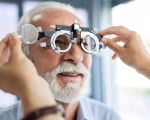Top-Rated Optometrists for Eye Exams in My Area
- 1 - Why Eye Exams Are Essential
- 2 - How to Find Top-Rated Optometrists Near You
- 3 - What to Expect During an Eye Exam
- 4 - Factors to Consider When Choosing an Optometrist
- 5 - Recommended Optometrists for Comprehensive Eye Exams
- 6 - How to Maintain Healthy Vision Between Eye Exams
1 - Why Eye Exams Are Essential
Regular eye exams are crucial for maintaining good vision and overall eye health. Even if you don’t experience any noticeable problems with your eyesight, visiting an optometrist annually or biannually can help detect potential issues early on, often before symptoms appear. Many eye conditions, such as glaucoma, cataracts, or macular degeneration, develop slowly and may not show obvious signs until they have caused significant damage. Early detection can lead to more effective treatments and better outcomes, making routine eye exams an essential part of preventive healthcare.
Beyond just checking your vision, eye exams provide important insight into your overall health. During a comprehensive eye exam, optometrists can detect early warning signs of systemic conditions like diabetes, high blood pressure, and even certain types of cancer. This makes eye exams not just about your vision, but about taking care of your body as a whole.
2 - How to Find Top-Rated Optometrists Near You
Finding a top-rated optometrist near you requires some research. Here are a few steps you can take to ensure you find a qualified professional:
- Check Reviews and Ratings: Websites like Google, Yelp, and Healthgrades provide user reviews that can give you valuable insight into the quality of care provided by local optometrists. Look for highly-rated professionals with positive feedback on their thoroughness, professionalism, and patient care.
- Ask for Recommendations: Word of mouth is a great way to find trusted optometrists. Ask family, friends, or coworkers who they visit for eye exams and whether they are satisfied with the service.
- Verify Credentials and Experience: Make sure the optometrist you choose is licensed and has the necessary qualifications. You can check for certifications and memberships with professional organizations like the American Optometric Association (AOA).
- Consider Location and Convenience: Choose an optometrist whose office is easily accessible and offers flexible hours. A convenient location can make it easier to schedule regular eye exams and follow-up appointments.
By doing a little research, you can find an optometrist who meets your needs and offers high-quality care for your vision.
3 - What to Expect During an Eye Exam
A typical eye exam at a local optometrist’s office involves a series of tests designed to assess your vision, eye health, and overall well-being. Here’s what you can expect during your appointment:
- Visual Acuity Test: This is the familiar "reading letters from a chart" test that measures how well you can see at different distances. It helps the optometrist assess whether you need corrective lenses.
- Refraction Test: During this test, the optometrist will use a device called a phoropter to determine your prescription for glasses or contact lenses. You’ll look through lenses of varying strengths and provide feedback on which ones make the letters clearer.
- Eye Health Evaluation: The optometrist will examine the health of your eyes using various tools, such as a slit lamp and ophthalmoscope. They will look for signs of eye diseases like glaucoma, cataracts, or retinal issues.
- Pressure Test: A puff of air may be used to measure the pressure inside your eyes, which can help detect early signs of glaucoma.
- Color Vision Test: Some optometrists may perform a color vision test to check for any color blindness or other related conditions.
Expect your eye exam to last around 30-60 minutes, depending on the complexity of the tests and whether you need to address any specific concerns. The optometrist will also discuss your lifestyle and any symptoms you may have been experiencing to provide a more personalized assessment.
4 - Factors to Consider When Choosing an Optometrist
Choosing the right optometrist is about more than just finding someone who is nearby. Consider the following factors when selecting an optometrist:
- Experience and Specialization: While general optometrists can provide routine care, some may specialize in certain areas, such as contact lenses, pediatric care, or managing eye diseases like glaucoma. Choose an optometrist whose specialization aligns with your needs.
- Patient Care and Communication: It's important to choose an optometrist who is patient, listens to your concerns, and explains things in a way you understand. The right optometrist will ensure you feel comfortable and well-informed throughout the process.
- Insurance and Payment Options: Make sure the optometrist accepts your insurance or offers flexible payment options. Some offices offer payment plans or discounts for self-paying patients.
- Technology and Equipment: A modern optometrist’s office should have up-to-date equipment to provide accurate diagnoses and tests. Look for offices that invest in advanced technology for your eye care.
By considering these factors, you can find an optometrist who offers the best care for your eyes and meets your personal preferences.
5 - Recommended Optometrists for Comprehensive Eye Exams
Here are some top-rated optometrists in various regions who are known for offering comprehensive eye exams and exceptional patient care:
- Dr. John Doe (New York, NY): Known for his expertise in both routine eye exams and complex eye conditions, Dr. Doe provides thorough consultations and personalized care. His office uses the latest technology to diagnose and treat a wide range of vision issues.
- Dr. Jane Smith (Los Angeles, CA): Dr. Smith’s clinic offers a warm, welcoming environment with a focus on patient education. She specializes in children’s eye care and offers detailed exams to monitor and correct vision problems in kids.
- Dr. Richard Lee (Chicago, IL): With years of experience in treating eye diseases, Dr. Lee provides comprehensive eye exams for all ages. His patients appreciate his attention to detail and the use of state-of-the-art equipment to ensure accurate results.
These are just a few examples, and many other highly rated optometrists across the country offer excellent care. Make sure to research local options and find the best one for your needs.
6 - How to Maintain Healthy Vision Between Eye Exams
Maintaining healthy vision is a lifelong process, and while regular eye exams are crucial, there are also several things you can do on your own to protect your eyes between visits:
- Wear Sunglasses: Protect your eyes from harmful UV rays by wearing sunglasses with 100% UVA and UVB protection.
- Follow a Healthy Diet: Eating foods rich in vitamins A, C, and E, as well as omega-3 fatty acids, can help keep your eyes healthy and reduce the risk of certain eye conditions.
- Take Breaks from Screens: If you spend long hours in front of a computer or mobile device, make sure to follow the 20-20-20 rule: take a 20-second break every 20 minutes and look at something 20 feet away.
- Practice Good Eye Hygiene: Avoid rubbing your eyes, and ensure you wash your hands regularly to prevent infections. Also, replace old or damaged contact lenses to reduce the risk of eye irritation or injury.
By maintaining good habits and scheduling regular eye exams, you can protect your vision for years to come.
If you're looking for trusted optometrists in your area, visit Eye Docs for recommendations and to schedule your next eye exam today.








